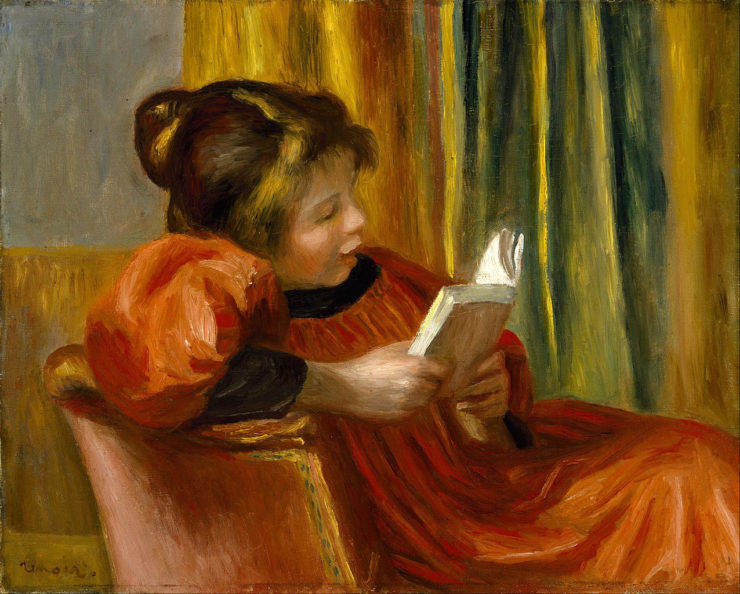At the end of May, covid finally caught me. And while it is a small complaint in the grand scheme of these things, reading has been a challenge in the wake of that illness. Focus? Thoughts that connect to one another? An attention span that works for more than fifteen minutes? I’m working on getting these back.
Part of that work takes the shape of a resolution to read for an hour every day. I am, I admit, mostly failing at this resolution. Sometimes I trick myself, make deals, try bribery: I can go get a drink on the bar patio if I don’t look at my phone for two chapters. I ignore all obligations to sit on the balcony as the sun fades and crack open a new novel. I simply decide that I am not allowed to get up until I finish a chapter, at least. (No rules about the length of the chapter.) This is all very weird for me. I usually read everywhere and all the time. Did covid do something in my brain, or just make me tired?
Or did I just watch way too much TV? Am I hooked on short-term resolutions, 43 to 57 minute blocks of story carefully structured to keep me coming back for more? Is this why I now want to wait until Westworld’s fourth season is over so I can watch it all at once, when I’ve always been a please-give-me-one-episode-per-week person? Was that handful of episodes of Legends of Tomorrow bad for my covid brain? Am I just that attached to La’an and Ortegas on Star Trek: Strange New Worlds that the imaginary people in all these books aren’t doing it for me?
My tactic, when I feel detached from reading, is usually to use that detachment as a way back in. What do I want? Satisfaction. When do I want it? Now, yesterday, tomorrow, all the time. Do you need something simple and smooth to reacclimate your brain after covid, after winter, after the flurry of crushing news stories of the last few weeks? I can’t help with the last one, I don’t think. That’s a whole different scale. But if you want to break free of the streaming platforms’ grip, here are a few ideas.
If you just want to hang out with Obi-Wan Kenobi: There are many very good Star Wars books, but if you forced me to recommend just one, I would hand you Claudia Gray’s Bloodline every time. It’s similar to Obi-Wan’s TV adventures in that it finds a major character—in this case, Leia—in mid-life, and facing a new threat. It’s a political thriller, a new version of Leia that we’ve never really gotten to spend time with, and it gently makes sense of some of Kylo Ren’s personality traits. Gray’s Star Wars novels have yet to disappoint me; she seems to have the whole galaxy neatly stored in her brain, and is able to loop in characters and references without ever using a heavy hand.
If you are still watching Westworld even though it makes no sense: There are a lot of good books about robots, and a lot of good books about the world not being what it seems, and honestly this show kind of makes me want to reread Neuromancer. But let us give the brilliant Charles Yu—a story editor on Westworld’s first season—some of our (shattered) attention span. Yu won the National Book Award for Interior Chinatown, a beautiful book sometimes written in the form of a screenplay (complete with end credits recognizing everyone who worked on the book). But you should go back in time to his debut, How to Live Safely in a Science Fictional Universe, a book that haunts me. There is time travel; there are other versions of Charles Yu (the protagonist, not the author); there are AIs and other universes; and there is real human feeling, which Westworld so often lacks. You know how sometimes you read a book in just the right place? I read this one on a Greyhound bus, neither here nor there, floating with the narrative, sucked in, wrapped up. Get on a train with this one. Maybe leave your phone at home.
If you are still looking forward to House of the Dragon despite everything: My friend, there are so many other dragons out there. There are the upright rule-following human-dragons of Rachel Hartman’s Seraphina and sequels, which come with excellent political intrigue and a great throuple. There are the small city-dwelling dragons of Cynthia Zhang’s After the Dragons, which is the opposite of Game of Thrones in just about every conceivable way. There’s a wonderful wyvern—a wyverary, actually; he’s part library—in Catherynne Valente’s Fairyland books, which are just the right kind of soothing, arch, and wise. Or you might take another angle and pick up Daniel Abraham’s Age of Ash, which is political fantasy that remembers the ordinary people who are just trying to live in these fraught cities ruled by ruthless creeps. And if you would really like to see more teenage girls with dragons? Destiny Soria has you covered with Fire With Fire.
If you would like to visit space without all the hijinks and alien goo and threat of getting spaced that seems to constantly happen on The Expanse and Lost in Space and all the other SF shows: It is never not a good time to read Becky Chambers. To Be Taught, If Fortunate is the space exploration novella I did not know I really, really needed—a story not about starship captains and hotshot pilots but about science nerds who really love their jobs, and who are very worried about what’s happening back home. Home being, you know, here, but in the future, and with more climate disasters (the ones that seem more and more inevitable). If you are not opposed to reading middle grade novels, you might also try Erin Entrada Kelly’s endearing We Dream of Space, which is also (in part) about a science nerd—just a much younger one. Fair warning: It is also a bit of a heart-punch for anyone who remembers or was obsessed with the Challenger explosion.
If you’ve been spending a lot of time with Daredevil and Russian Doll’s New York: Please bear with me as I recommend another book for young readers, but if you want magic and New York and you have not read Diane Duane’s So You Want to Be a Wizard, please rectify that immediately. There are so many magical NYCs, from Duane to N.K. Jemisin’s The City We Became to Sarah Porter’s Vassa in the Night to a whole pile of edging-toward-literary books with fae or time travel or slight magical shifts, that I now want to make a whole list of just them. Chronic City! Shadowshaper! The Changeling! And, yes, the Cassandra Clare books, to which I am forever grateful for one specific thing: though I lived nearby for years, I did not know about the New York Marble Cemetery until I read them.
If you are looking for a book that ought to be made into a single brilliant season of prestige TV: It’s inexplixable that Hari Kunzru’s brilliant, sharp White Tears hasn’t already gotten the glossy adaptation treatment, except that it’s too many things for TV to easily get a handle on: a ghost story, a mystery, a satire, a sincere love letter, and a novel that doesn’t pull a single punch. It’s not exactly speculative, but it’s not not speculative, either, and it ought to be much more widely read among those of us who like it when things just get really, really, really fucking weird.
If you just want to have all the feelings provided by the glorious disasters of The Magicians: This is what I have not yet found. I need troubled jerks who are hiding their majestic hearts, stupid boys learning they’re not always the center of the universe, powerful witches coming into their own, anyone, literally anyone who will charm me as much as Eliot Waugh, and maybe a sarcastic traveler and a wise professor type who’s actually just as screwed up as their students. Any suggestions?
Molly Templeton lives and writes in Oregon, and spends as much time as possible in the woods. Sometimes she talks about books on Twitter.














